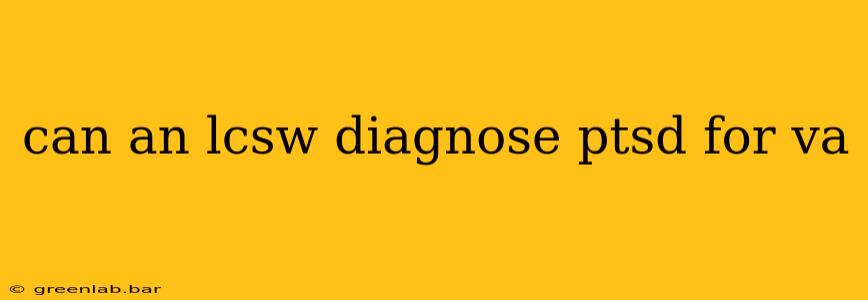The question of whether a Licensed Clinical Social Worker (LCSW) can diagnose PTSD for VA disability claims is a complex one, often leading to confusion among veterans seeking benefits. The short answer is: yes, but with important caveats. While an LCSW is qualified to diagnose PTSD, the VA's acceptance of that diagnosis hinges on several factors.
Understanding the VA's Requirements for PTSD Diagnosis
The Department of Veterans Affairs (VA) has specific requirements for evaluating disability claims, including those related to Post-Traumatic Stress Disorder (PTSD). While the VA accepts diagnoses from various medical professionals, the weight given to a diagnosis depends on several factors:
- Licensed Professional: The diagnosing clinician must hold a valid license to practice in their respective state. For an LCSW, this means possessing a current, active LCSW license.
- Diagnostic Criteria: The diagnosis must adhere to the Diagnostic and Statistical Manual of Mental Disorders (DSM-5) criteria for PTSD. This ensures consistency and accuracy in diagnosis across the board.
- Supporting Documentation: A thorough evaluation including a detailed history of the trauma(s) experienced, symptoms experienced, and how those symptoms impact daily life is crucial. The report should clearly link the PTSD diagnosis to in-service events or stressors. This documentation is key to substantiating the claim.
- Examiner's Qualifications: While an LCSW can diagnose PTSD, the VA may place more weight on a diagnosis from a psychiatrist or psychologist, particularly in complex cases. This isn't to say an LCSW diagnosis is invalid, but it might necessitate further evaluation.
- VA's Own Examinations: The VA may conduct its own independent medical examinations (IMEs) to verify the diagnosis and assess the severity of the condition. These evaluations can corroborate or challenge the initial diagnosis provided by the LCSW.
The Role of the LCSW in the VA Disability Claim Process
LCSWs play a vital role in supporting veterans' mental health and aiding in their VA disability claims. They provide therapy, conduct thorough assessments, and meticulously document their findings. Their expertise in diagnosing and treating mental health conditions, including PTSD, is valuable. However, it's crucial for veterans to understand that the LCSW's role is one piece of a larger puzzle.
Strengths of an LCSW Diagnosis:
- Accessibility: LCSWs are often more readily accessible than psychiatrists or psychologists, making initial diagnosis and treatment more convenient.
- Therapeutic Relationship: A strong therapeutic relationship with an LCSW can facilitate a comprehensive understanding of the veteran's experience and symptoms.
- Holistic Approach: Many LCSWs take a holistic approach to treatment, considering various factors affecting the veteran's well-being.
Potential Challenges:
- Weight of the Diagnosis: As previously mentioned, the VA might assign less weight to an LCSW diagnosis compared to a psychiatrist or psychologist.
- Need for Supplemental Evidence: The VA may request additional medical evidence or a second opinion, especially in cases involving significant disability ratings.
Conclusion: Getting the Best Support for Your VA Claim
While an LCSW can diagnose PTSD for VA disability claims, it's essential to work closely with a qualified mental health professional who understands the VA's specific requirements. Open communication between the veteran, their LCSW, and potentially other healthcare providers is critical for building a strong and compelling claim. Veterans should ensure their diagnosis is thoroughly documented, with clear connections made between their in-service experiences and their current symptoms. This proactive approach will significantly improve the chances of a successful claim. If you have concerns about the strength of your claim based on your LCSW's diagnosis, you might consider seeking a second opinion from a psychiatrist or psychologist specializing in PTSD and VA disability claims.

